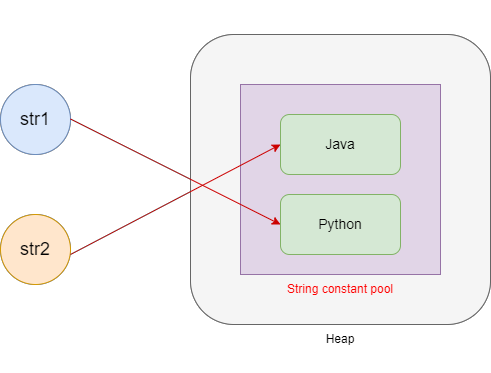Why Are Strings Immutable in Java? Comprehensive Guide for Beginners
Why Are Strings Immutable in Java? Comprehensive Guide for Beginners
Blog Article
What Is Unalterable Strings and Just How It Works
In the realm of programs, comprehending the idea of unalterable strings is extremely important for developing durable and safe and secure applications. Unalterable strings describe strings that can not be modified after they are created, guaranteeing information honesty and predictability within the code. This fundamental concept plays an essential role in different programming languages and uses a special approach to handling data. By exploring the ins and outs of just how unalterable strings function, one can uncover a world of benefits and opportunities that can elevate the high quality and efficiency of software advancement.
The Basics of Immutable Strings
Immutable strings, as an essential principle in programming, are personality series that can not be altered once they are created. This implies that as soon as a string is designated a worth, that value can not be modified. In languages like Python and Java, strings are immutable items, resulting in different implications in regards to memory administration and information stability.
Among the essential advantages of unalterable strings is that they supply a feeling of security in data manipulation. Considering that the material of an unalterable string can not be customized, it ensures that the original information stays undamaged, minimizing the risk of unintentional adjustments throughout program execution (Why are strings immutable in Java?). This building additionally simplifies debugging processes, as designers can trust that once a string is defined, its worth will certainly not be inadvertently modified
When a new string is produced based on an existing one, instead than changing the original string, the brand-new value is kept individually. In general, comprehending the essentials of unalterable strings is essential for mastering programming ideas and optimizing code efficiency.
Benefits of Unalterable Strings
Building upon the safety and performance advantages of immutable strings, their advantages include improving code dependability and simplifying concurrent programming tasks. By being unalterable, strings can not be changed after creation, which eliminates the threat of unexpected modifications in the data they store. This inherent immutability makes certain that when a string is produced, its worth remains consistent throughout the program's execution, decreasing the opportunities of insects triggered by unanticipated alterations.
In addition, unalterable strings add to code reliability by making it less complicated to reason regarding the state of a program. Because strings can not be transformed, designers can trust that a string will always hold the same value, simplifying debugging and maintenance initiatives. This predictability leads to a lot more steady and dependable codebases.

Execution in Shows Languages
Within numerous shows languages, the incorporation of immutable strings is a basic facet that influences how data is dealt with and controlled within code frameworks. The application of immutable strings varies across various programming languages, with each language providing its own systems to support this idea.

In comparison, languages like C and C++ do not have integrated assistance for unalterable strings. Programmers in these languages should by hand execute immutability by applying rules within their code to avoid straight modifications to string items.
Ideal Practices for Collaborating With Unalterable Strings
When taking care of unalterable strings in programming languages like Java and Python, adhering to best practices guarantees protected and reliable data control. Among the vital finest practices is to use StringBuilder or StringBuffer rather than straight manipulating strings, specifically when taking care of considerable concatenation procedures. These courses give mutable options for string adjustment, assisting to avoid unnecessary memory allotments and boosting efficiency.
In addition, when working with sensitive data such as passwords or API tricks, it is essential to stay clear of keeping them as simple message in immutable strings. Using safe storage space devices like char varieties or specialized libraries for managing delicate details assists minimize protection threats connected with unalterable strings.
Real-world Applications and Examples
Exploring useful executions of immutable strings in numerous sectors reveals their substantial influence on information integrity and system integrity. In the healthcare sector, unalterable strings play an important role in making certain the safety and privacy of patient information. By stopping unapproved alterations to sensitive information such as medical records and prescriptions, unalterable strings help maintain compliance with stringent personal privacy guidelines like HIPAA.
Banks also take advantage of the immutable nature of strings to improve the safety and security of consumer information and purchase documents. Immutable strings assist avoid fraudulence and unapproved alterations to financial information, offering a durable defense versus cyber dangers and making sure the trust fund and confidence Visit Website of clients.

Verdict
Best techniques for functioning with immutable strings include staying clear of direct alterations and making use of approaches that return new string objects. Real-world applications of unalterable strings consist of information file encryption, caching, and string adjustment tasks.
Immutable strings refer to strings that can not be modified after they are created, making certain data integrity and predictability within the code. When a brand-new string is developed based on an existing click for more one, instead than modifying the initial string, the new worth is saved separately.In languages like Java and Python, strings are immutable by default, suggesting that when a string object is produced, its worth can not be altered - Why are strings immutable in Java?. Finest methods for working with unalterable strings consist of preventing straight modifications and utilizing techniques that return brand-new string items. Real-world applications of immutable strings consist of data encryption, caching, and string manipulation tasks
Report this page